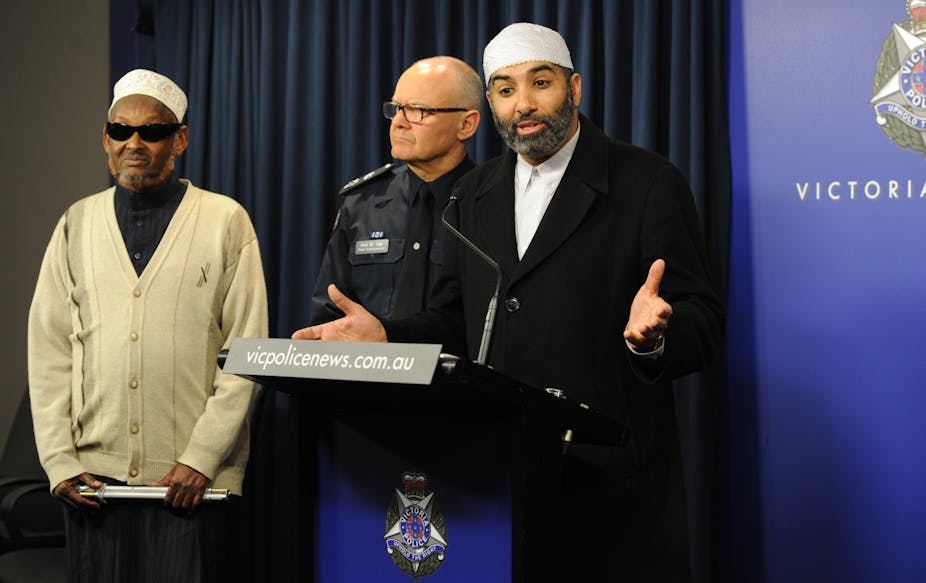Muslim communities in Australia feel under siege. It is evident from media reports that they feel unfairly targeted by counter-terrorism policing. They also feel vilified by much of the reporting of these activities.
Changes to counter-terrorism laws, highly publicised raids and arrests in Sydney and Melbourne of alleged supporters of Islamic State, the police shooting of Numan Haider in Melbourne and calls to “ban the burqa” have exacerbated this sense of being under attack. The defacing of mosques, the intimidation and abuse of Muslim women in public and recent federal and state moves to “ban the burqa” only reinforce perceptions among Muslims that they are not seen as valued and respected members of Australian society.
In such a context, how do the police go about reversing or overcoming the resentment, hostility and backlash against counter-terrorism policing and laws among Muslim communities in Australia? If one accepts the argument that communities are a key line of defence against terrorist propaganda, radicalisation and violence, then this is an important question.
One reason this issue matters is that community resistance and hostility to counter-terrorism policies and laws undermine the very legitimacy of these measures. This threatens their overall effectiveness by leading Muslims to withdraw their consent to cooperation with efforts to tackle terrorism and the influence of violent extremism.
How do Muslims feel about counter-terrorism activities?
This topic has been a focus of Australian Research Council-funded research we are conducting. We are exploring the impact of counter-terrorism policing and laws on Muslim communities in Australia. Our research has involved 14 focus groups, totalling 104 participants, and a survey of 800 Muslims living in Brisbane, Sydney and Melbourne.
The aim of the research has been twofold:
to gauge perceptions among Muslims in Australia about the fairness of counter-terrorism policing and laws
to identify how community cooperation with counter-terrorism operations and strategies can be enhanced.
Results from the focus groups indicate that Muslims identify strongly with being Australian. They report, though, that the “war on terror” and resulting policies and laws have had a profound impact on their sense of identity and whether they feel accepted as part of the Australian population.
A key finding across the focus groups and the survey is that Muslims accept legal and police responses to terrorism are needed. The issue is in their application.
For example, more than half of the survey sample reported they had confidence in Australia’s counter-terrorism laws. At the same time, they believed Muslims were unfairly targeted. Fairness in the application of the laws and in relation to issues of police targeting of Muslims were key themes across the data.

Why are trust and procedural justice so important?
What we have found is that trust in police and judgements relating to procedural justice play an important role in counter-terrorism. Procedural justice encompasses being treated with dignity and respect, being given a voice in decision-making and being treated in an unbiased manner. This also involves authorities communicating that they have people’s best interests at heart.
Research has consistently demonstrated that when people judge the police as treating them with procedural justice they are more likely to cooperate and see police actions as legitimate. Our survey results show four very important findings about the role of trust and procedural justice.
We found that:
Muslims who feel more under siege (i.e. they feel targeted by the police and the media) are less trusting of police, are less likely to identify with Australia and are less willing to cooperate with police.
Muslims who trust police are more willing to participate in counter-terrorism education within their community and to report suspicious terror-related activity to police.
If Muslims feel the police observe procedural justice in counter-terrorism policing they are more likely to trust police and are less likely to feel under siege.
If Muslims feel there is procedural justice they are less likely to believe terrorists have valid grievances.
It needs to be recognised that efforts by police and governments to engage Muslim communities are difficult in the current climate. However, our research indicates that procedural justice in counter-terrorism policing and trust in police can potentially buffer the hostility and resentment that Muslim communities have towards counter-terrorism policies and laws. This is an essential component of a “hearts and minds” approach to countering terrorism.

